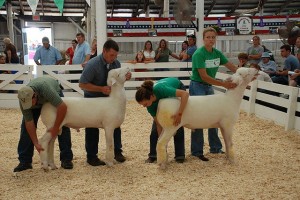There is a great article on spiritual theology in the old Catholic Encyclopedia. When it comes to explaining the “Means for realizing the Christian ideal” it suggest five activities that will help us head in the right direction: prayer, self-denial, labor, suffering and the virtues. I found the segment on labor to be curiously enlightening–partly because preachers seem to avoid the topic of work for the most part and partly because way fewer people in American society do manual labor than formerly. Most of us are doing some form of mental labor. Here’s the passage from the Encyclopedia:
(3) Labour, also, is subservient to the striving after perfection. Untiring labour runs counter to our corrupt nature, which loves ease and comfort. Hence labour, if well-ordered, persistent, and purposeful, implies self-denial. This is the reason why the Catholic Church has always looked upon labour, both manual and mental, as an ascetic means of no small value (cf. Cassian, “De instit. coenob.”, X, 24; St. Benedict, Rule, xlviii, li; Basil, “Reg. fusius tract.” c. xxxvii, 1-3; “Reg. brevius tract.”, c. lxxii; Origen, Against Celsus I.28). St. Basil is even of the opinion that piety and avoidance of labour are irreconcilable in the Christian ideal of life (cf. Mausbach, “Die Ethik des hl. Augustinus”, 1909, p. 264). Source: http://www.newadvent.org/cathen/14613a.htm
I have often heard of manual labor being something that can help one pray. I mean, the monks take “Ora et Labora” as their motto, that is, “Pray and Work.” But their work is usually farm work, cheese making, or even brewing. Only a few monks engage in the “mental labor” of handling the monastery finances or theological scholarship. But in our time, as I mentioned above, most of us are engaged in mental labor–whether that be computer programming, organizing business deals, investing, accounting, advising, etc. From attorneys to customer service representatives to money managers to theologians, many, many people are doing mental labor rather than manual labor. But I don’t think most of us assess our mental labor as an “ascetic means of no small value.” But maybe we should.
The article provides a few references on the topic. Here are the quotes I could find:
Rule of St. Benedict, article 48 (I’ve bolded the parts that equate “reading”/mental labor with work. Monks were required to read during the work periods of their day. Note also that reading was an ascetical practice for Lent.):
Idleness is the enemy of the soul; and therefore the brethren ought to be employed in manual labor at certain times, at others, in devout reading. Hence, we believe that the time for each will be properly ordered by the following arrangement; namely, that from Easter till the calends of October, they go out in the morning from the first till about the fourth hour, to do the necessary work, but that from the fourth till about the sixth hour they devote to reading. After the sixth hour, however, when they have risen from table, let them rest in their beds in complete silence; or if, perhaps, anyone desireth to read for himself, let him so read that he doth not disturb others. Let None be said somewhat earlier, about the middle of the eighth hour; and then let them work again at what is necessary until Vespers.
If, however, the needs of the place, or poverty should require that they do the work of gathering the harvest themselves, let them not be downcast, for then are they monks in truth, if they live by the work of their hands, as did also our forefathers and the Apostles. However, on account of the faint-hearted let all things be done with moderation.
From the calends of October till the beginning of Lent, let them apply themselves to reading until the second hour complete. At the second hour let Tierce be said, and then let all be employed in the work which hath been assigned to them till the ninth hour. When, however, the first signal for the hour of None hath been given, let each one leave off from work and be ready when the second signal shall strike. But after their repast let them devote themselves to reading or the psalms.
During the Lenten season let them be employed in reading from morning until the third hour, and till the tenth hour let them do the work which is imposed on them. During these days of Lent let all received books from the library, and let them read them through in order. These books are to be given out at the beginning of the Lenten season.
Above all, let one or two of the seniors be appointed to go about the monastery during the time that the brethren devote to reading and take notice, lest perhaps a slothful brother be found who giveth himself up to idleness or vain talk, and doth not attend to his reading, and is unprofitable, not only to himself, but disturbeth also others. If such a one be found (which God forbid), let him be punished once and again. If he doth not amend, let him come under the correction of the Rule in such a way that others may fear. And let not brother join brother at undue times.
On Sunday also let all devote themselves to reading, except those who are appointed to the various functions. But if anyone should be so careless and slothful that he will not or cannot meditate or read, let some work be given him to do, that he may not be idle.
Let such work or charge be given to the weak and the sickly brethren, that they are neither idle, nor so wearied with the strain of work that they are driven away. Their weakness must be taken into account by the Abbot.
John Cassian, Institutes of the Coenobia, Book X, chapter 24 on the ascetical value of manual labor:
LASTLY, Abbot Paul, one of the greatest of the Fathers, while he was living in a vast desert which is called the Porphyrian desert,[374] and being relieved from anxiety by the date palms and a small garden, had plenty to support himself, and an ample supply of food, and could not find any other work to do, which would support him, because his dwelling was separated from towns and inhabited districts by seven days’ journey,[375] or even more, through the desert, and more would be asked for the carriage of the goods than the price of the work would be worth; he collected the leaves of the palms, and regularly exacted of himself his daily task, as if he was to be supported by it. And when his cave had been filled with a whole year’s work, each year he would burn with fire that at which he had so diligently laboured: thus proving that without manual labour a monk cannot stop in a place nor rise to the heights of perfection: so that, though the need for food did not require this to be done, yet he performed it simply for the sake of purifying his heart, and strengthening his thoughts, and persisting in his cell, and gaining a victory over accidie and driving it away.
St. Basil explains a lot about the ascetical value of work in his Longer Rules, Regulæ fusius tractatæ (Discussed in this book: E.F. Morison, St. Basil and His Rule, Chapter IX, “The Monk at Work” here: http://archive.org/stream/basilsrule00moriuoft/basilsrule00moriuoft_djvu.txt).
Ah, and here’s a link to the Mausbach book on the Ethics of St. Augustine, p. 264.
The main point of all this is that labor can be a means of sanctification and that “mental labor” — reading, research, email, thinking, meeting — can be just as sanctifying as manual labor.


